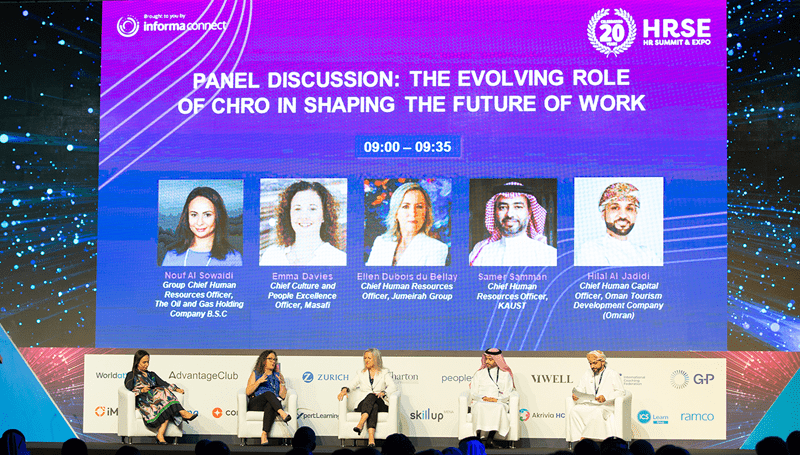
The role Chief human resources officer (CHRO) is evolving from a traditional role to one of a strategic value that not only looks at the people’s strategy but also the business strategy and make sure they can guide businesses into incorporating both.
“We need to unlearn everything we have done before. We have to change our behaviors,” said Emma Davies , Chief Culture and People Excellence Officer, Masafi during a panel discussion, under the title the evolving role of CHRO in shaping the future of work, at HR Summit & Expo (HRSE), the Middle East’s largest HR conference and exhibition
Davies elaborated that it is important to look at the policies and regulations and understand why they exist given the different workforce.
Post pandemic, employees have changed from exploring other markets to change in the way work is done. Giving employees a sense of purpose, encouraging them to become mentors and creating an anticipation of change could be a main factor in retaining people in the companies.
“The key strategy is to continue to get feedback from your employees,” said Samer Samman, Chief Human Resources Officer, KAUST. Samman said for example they wanted to move students into a hybrid model but after conducting a survey they found that students wanted to go back to campus instead.
“You need to manage expectations, listen carefully and that will shape your policies and procedures and the future of work,” he added.
In today’s world, CHROs do not only think about employee recruitment but also about employee engagement, learning and the sustainability of the businesses. CHRO’s role now is becoming more of a guidance for the CEO.
“You need to think like a CEO,” added Samman, explaining that CHROs have to incorporate the wellbeing of the business in their strategy and oversee the overall continuity of the business.
“We as CHROs need to get the basics right so that our CEOs do not need to worry about it, they know we got that in hand,” said Ellen Dubois du Bellay, Chief Human Resources Officer, Jumeirah Group.
“Our duty is to really help see human capital as a long term goal of the organisations,” added Bellay, explaining that their job is to put steps that might not be quick fixes for the organisation.
“I think that young employees and old employees and mid-life employees all want to feel a sense of belonging and for me is trying to connect the work they do with something meaningful,” she explained.
“We try to remind our employees of how important they are in the stay of our guests, so really trying to make people see the value of things and that feeling of belonging,” she added.
An example from the region is BAFCO in Bahrain which created simulation studios for operators and technicians to have practical experience without the risk of being in the refinery itself.
“Giving people something to look forward to, a sense of purpose, and anticipation of change,” said Nouf Al Sowaidi – Group Chief Human Resources Officer, the Oil and Gas Holding Company.